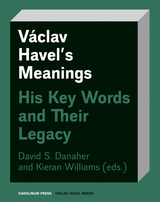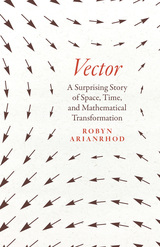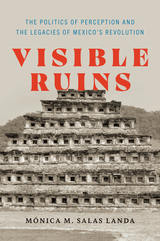
The main aim of Art, Sustainability and Learning Communities is to show how shared spaces for exchange in the fields of art education and continuous professional development can reflect, inspire, and integrate sustainability principles that are becoming crucial in today’s world. The authors propose the idea that coordinated action can lead to a more sustainable future by promoting a sense of community, lifelong learning, and confidence in the possibility of changing current conditions.
Its three parts combine expertise in visual arts education, education for sustainable development, contemporary art practice, and sustainability activism. While Part I focuses on literature in the field and the interrelation of different disciplines, Part II provides concrete examples of professional learning communities and pedagogies that can be used to enrich the field of art education. Finally, Part III presents brief case studies illustrating international projects by contemporary artists, curators, environmentalists, and others, providing educators with several inspirational models of concrete and creative action.
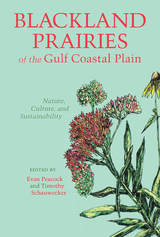
Underscores the relevance of archaeological research in understanding long-term cultural change
Taking a holistic approach, this compilation gathers ecological, historical, and archaeological research written on the distinctive region of the Southeast called the Gulf coast blackland prairie. Ranging from the last glacial period to the present day, the case studies provide a broad picture of how the area has changed through time and been modified by humans, first with nomadic bands of Indians trailing the grazing animals and then by Euro-American settlers who farmed the rich agricultural area. Contemporary impacts include industrialization, aquaculture, population growth, land reclamation, and wildlife management.
It is believed that the Black Belt and the Great Plains were contiguous in the past and shared the same prairie vegetation, insects, and large fauna, such as bison. Swaths and patches of limestone-based soils still weave a biological corridor through what is now Alabama, Mississippi, Arkansas, Louisiana, and Texas. In analyzing this distinct grassland ecosystem, the essays compare both the mega and minute flora and fauna sustained by the land in the past and present; reveal what foods were harvested by early inhabitants, their gathering techniques, and diet changes over the 10,000-year period of native occupancy; survey the documents of early explorers for descriptions of the landform, its use, and the lives of inhabitants at the time of contact; and look at contemporary efforts to halt abuse and reverse damage to this unique and shrinking biome.
This book demonstrates that the blackland prairie has always been an important refuge for a teeming array of biological species, including humans. It will have wide scholarly appeal as well as general interest and will be welcomed by archaeologists, biologists, botanists, ecologists, historians, librarians, politicians, land managers, and national, state, and local administrators.
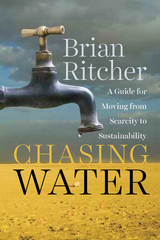
International water expert Brian Richter argues that sustainable water sharing in the twenty-first century can only happen through open, democratic dialogue and local collective action. In Chasing Water, Richter tells a cohesive and complete story of water scarcity: where it is happening, what is causing it, and how it can be addressed. Through his engaging and nontechnical style, he strips away the complexities of water management to its bare essentials, providing information and practical examples that will empower community leaders, activists, and students to develop successful and long-lasting water programs.
Chasing Water will provide local stakeholders with the tools and knowledge they need to take an active role in the watershed-based planning and implementation that are essential for water supplies to remain sustainable in perpetuity.

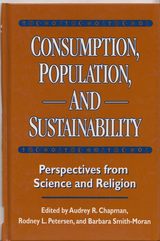
The combined contributions of science and religion to resolving environmental problems are far greater than each could offer working in isolation. Scientific findings are central to understanding the impact of human populations on the environment, but a more ecologically sustainable future will require radical changes in values, lifestyle choices, and consumption patterns -- a revolution that falls squarely within the domain of the religious community.
Consumption, Population, and Sustainability is an outgrowth of a conference sponsored jointly by the Boston Theological Institute and the American Association for the Advancement of Science that brought together more than 250 scientists and people of religious faith to discuss the environmental impact of consumption patterns and population trends, and to consider alternative and more equitable value systems, economic arrangements, and technologies that will be necessary for achieving a more sustainable future. The book:
- provides a brief history of the dialogue between science and religion on environmental issues
- outlines potential contributions of the religious community to the debate about global sustainability
- offers a science-based assessment of issues such as carrying capacity, sustainability indicators, and the environmental impacts of consumer-based lifestyles
- considers religious and theological perspectives on consumption and population from a variety of viewpoints including Roman Catholic, Jewish, Greek Orthodox, and Islamic
- examines the ethical and policy dimensions of reorienting today's consumer society to one more focused on values, spiritual growth, and relationships.
Both the scientific and religious communities can make important contributions to understanding and responding to the impact of population growth and consumption patterns on environmental sustainability. This volume represents a significant step in establishing an ongoing dialogue between the communities, and provides a thought-provoking overview of the issues for scientists, theologians, and anyone concerned with the future of global sustainability.
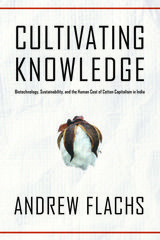
In Cultivating Knowledge anthropologist Andrew Flachs shows how rural farmers come to plant genetically modified or certified organic cotton, sometimes during moments of agrarian crisis. Interweaving ethnographic detail, discussions of ecological knowledge, and deep history, Flachs uncovers the unintended consequences of new technologies, which offer great benefits to some—but at others’ expense. Flachs shows that farmers do not make simple cost-benefit analyses when evaluating new technologies and options. Their evaluation of development is a complex and shifting calculation of social meaning, performance, economics, and personal aspiration. Only by understanding this complicated nexus can we begin to understand sustainable agriculture.
By comparing the experiences of farmers engaged with these mutually exclusive visions for the future of agriculture, Cultivating Knowledge investigates the human responses to global agrarian change. It illuminates the local impact of global changes: the slow, persistent dangers of pesticides, inequalities in rural life, the aspirations of people who grow fibers sent around the world, the place of ecological knowledge in modern agriculture, and even the complex threat of suicide. It all begins with a seed.
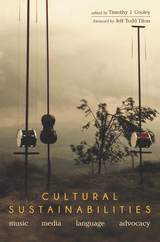
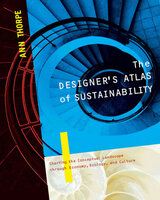
The Atlas is neither a how-to manual nor collection of recipes for sustainable design, but a compendium of fresh approaches to sustainability that designers can incorporate into daily thinking and practice. Illuminating many facets of this exciting field, the book offers ideas on how to harmonize human and natural systems, and then explores practical options for making the business of design more supportive of long-term sustainability. An examination of the ethical dimensions of sustainable development in our public and private lives is the theme present throughout. Like other kinds of atlases, The Designer's Atlas of Sustainability illustrates its subject, but it goes far beyond its visual appeal, stimulating design solutions for "development that cultivates environmental and social conditions that will support human well-being indefinitely."
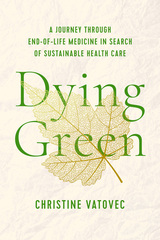
In Dying Green, award-winning educator Christine Vatovec offers an engaging study that asks us to consider the broader environmental sustainability of health care. Through a comparative analysis of the care provided to terminally ill patients in a conventional cancer ward, a palliative care unit, and an acute-care hospice facility, she shows how decisions made at a patient’s bedside govern the environmental footprint of the healthcare industry. Likewise, Dying Green offers insights on the many opportunities that exist for reducing the ecological impacts of medical practices in general, while also enhancing care for the dying in particular. By envisioning a more sustainable approach to care, this book offers a way forward that is better for both patients and the planet.
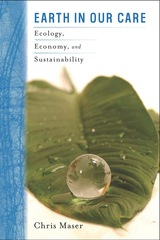
So writes Chris Maser in this compelling study of three interactive spheres of the ecosystem: atmosphere (air), litho-hydrosphere (rock that comprises the restless continents and the water that surrounds them), and biosphere (all life sandwiched in between).
Rich in detail and insightful analogies, Earth in Our Care addresses key issues including land-use policies, ecological restoration, forest management, local living, and sustainability thinking. Exploring our interconnectedness with the Earth, Maser examines today's problems and, more importantly, provides solutions for the future.
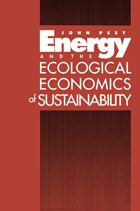
Energy and the Ecological Economics of Sustainability examines the roots of the present environmental crisis in the neoclassical economics upon which modern industrial society is based. The author explains that only when we view ourselves in the larger context of the global ecosystem and accept the physical limits to what is possible can sustainability be achieved.
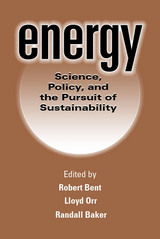
In the early 2000s, energy prices have fluctuated wildly, from historic highs in the winter and spring of 2001 to the lowest wholesale prices in decades a few short months later. As the largest user of fossil-fuel energy, the United States is the key player in the world's energy markets, and our nation's energy policy (or lack thereof) has become a subject of increasing concern.
Energy: Science, Policy, and the Pursuit of Sustainability is an essential primer on energy, society, and the environment. It offers an accessible introduction to the "energy problem" -- its definition, analysis, and policy implications. Current patterns of energy use are without question unsustainable over the long term, and our dependence on fossil fuels raises crucial questions of security and self-sufficiency. This volume addresses those questions by examining the three broad dimensions of the issue: physical, human, and political-economic. Chapters consider:
- the laws of nature and the impacts of energy use on our physical and ecological life-support systems
- the psychological, social, and cultural factors that determine how we use energy
- the role of government actions in adjusting costs, influencing resource consumption, and protecting the environment
- how markets work, and the reasons and cures for market failures in responding to long-term environmental and energy problems

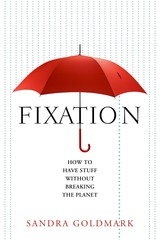
Since founding Fixup, a pop-up repair shop that brought her coverage in The New York Times, Salon, New York Public Radio, and more, Sandra Goldmark has become a leader in the movement to demand better “stuff.” She doesn’t just want to help us clear clutter—she aims to move us away from throwaway culture, to teach us to reuse and repurpose more thoughtfully, and to urge companies to produce better stuff. Although her goal is ambitious, the solution to getting there is surprisingly simple and involves all of us: have good stuff, not too much, mostly reclaimed, care for it, and pass it on.
Fixation charts the path to the next frontier in the health, wellness, and environmental movements—learning how to value stewardship over waste. We can choose quality items designed for a long lifecycle, commit to repairing them when they break, and shift our perspective on reuse and “preowned” goods. Together, we can demand that companies get on board. Goldmark shares examples of forward-thinking companies that are thriving by conducting their businesses sustainably and responsibly.
Passionate, wise, and practical, Fixation offers us a new understanding of stuff by building a value chain where good design, reuse, and repair are the status quo.

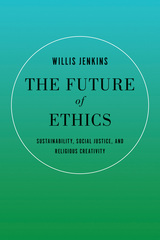
The Future of Ethics interprets the big questions of sustainability and social justice through the practical problems arising from humanity’s increasing power over basic systems of life. What does climate change mean for our obligations to future generations? How can the sciences work with pluralist cultures in ways that will help societies learn from ecological change?
Traditional religious ethics examines texts and traditions and highlights principles and virtuous behaviors that can apply to particular issues. Willis Jenkins develops lines of practical inquiry through "prophetic pragmatism," an approach to ethics that begins with concrete problems and adapts to changing circumstances. This brand of pragmatism takes its cues from liberationist theology, with its emphasis on how individuals and communities actually cope with overwhelming problems.
Can religious communities make a difference when dealing with these issues? By integrating environmental sciences and theological ethics into problem-based engagements with philosophy, economics, and other disciplines, Jenkins illustrates the wide understanding and moral creativity needed to live well in the new conditions of human power. He shows the significance of religious thought to the development of interdisciplinary responses to sustainability issues and how this calls for a new style of religious ethics.
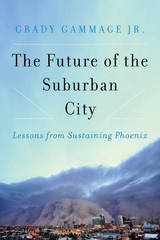
In The Future of the Suburban City, Phoenix native Grady Gammage, Jr. looks at the promise of the suburban city as well as the challenges. He argues that places that grew up based on the automobile and the single-family home need to dramatically change and evolve. But suburban cities have some advantages in an era of climate change, and many suburban cities are already making strides in increasing their resilience. Gammage focuses on the story of Phoenix, which shows the power of collective action — government action — to confront the challenges of geography and respond through public policy. He takes a fresh look at what it means to be sustainable and examines issues facing most suburban cities around water supply, heat, transportation, housing, density, urban form, jobs, economics, and politics.
The Future of the Suburban City is a realistic yet hopeful story of what is possible for any suburban city.
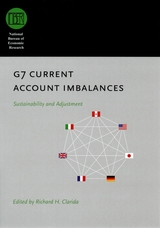
The current account deficit of the United States is more than six percent of its gross domestic product—an all-time high. And the rest of the world, including other G7 countries such as Japan and Germany, must collectively run current account surpluses to finance this deficit. How long can such unevenness between imports and exports be sustained, and what form might their eventual reconciliation take? Putting forth scenarios ranging from a gradual correction to a crash landing for the dollar, G7 Current Account Imbalances brings together economists from around the globe to consider the origins, status, and future of those disparities.
An esteemed group of collaborators here examines the role of the bursting of the dot-com bubble, the history of previous episodes of current account adjustments, and the possibility of the Euro surpassing the dollar as the leading international reserve currency. Though there are areas of broad agreement—that the imbalances will ultimately decline and that currency revaluations will be part of the solution—many areas of contention remain regarding both the dangers of imbalances and the possible forms of adjustment.
This volume will be of tremendous value to economists, politicians, and business leaders alike as they look to the future of the G7 economies.
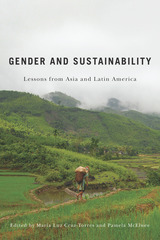
Bringing together case studies from Asia and Latin America, this valuable collection adds new knowledge to our understanding of the interplay between local and global processes. Organized broadly by three major issues—forests, water, and fisheries—the scholarship ranges widely: the gender dimensions of the illegal trade in wildlife in Vietnam; women and development issues along the Ganges River; the role of gender in sustainable fishing in the Philippines; women’s inclusion in community forestry in India; gender-based confrontations and resistance in Mexican fisheries; environmentalism and gender in Ecuador; and women’s roles in managing water scarcity in Bolivia and addressing sustainability in shrimp farming in the Mekong Delta.
Together these chapters show why gender issues are important for understanding how communities and populations deal daily with the challenges of globalization and environmental change. Through their rich ethnographic research, the contributors demonstrate that gender analysis offers useful insights into how a more sustainable world can be negotiated—one household and one community at a time.
Contributors
Stephanie Buechler
María Luz Cruz-Torres
Linda D’Amico
Georgina Drew
James Eder
Lisa L. Gezon
Pamela McElwee
Neera Singh
Hong Anh Vu
Amber Wutich

“Insightful tour de force… Farrell’s writing is as informative as it is intoxicating” -- Publishers Weekly
Shanna Farrell loves a good drink. As a bartender, she not only poured spirits, but learned their stories—who made them and how. Living in San Francisco, surrounded by farm-to-table restaurants and high-end bars, she wondered why the eco-consciousness devoted to food didn’t extend to drinks.
The short answer is that we don’t think of spirits as food. But whether it's rum, brandy, whiskey, or tequila, drinks are distilled from the same crops that end up on our tables. Most are grown with chemicals that cause pesticide resistance and pollute waterways, and distilling itself requires huge volumes of water. Even bars are notorious for generating mountains of trash. The good news is that while the good drink movement is far behind the good food movement, it is emerging.
In A Good Drink, Farrell goes in search of the bars, distillers, and farmers who are driving a transformation to sustainable spirits. She meets mezcaleros in Guadalajara who are working to preserve traditional ways of producing mezcal, for the health of the local land, the wallets of the local farmers, and the culture of the community. She visits distillers in South Carolina who are bringing a rare variety of corn back from near extinction to make one of the most sought-after bourbons in the world. She meets a London bar owner who has eliminated individual bottles and ice, acculturating drinkers to a new definition of luxury.
These individuals are part of a growing trend to recognize spirits for what they are—part of our food system. For readers who have ever wondered who grew the pears that went into their brandy or why their cocktail is an unnatural shade of red, A Good Drink will be an eye-opening tour of the spirits industry. For anyone who cares about the future of the planet, it offers a hopeful vision of change, one pour at a time.
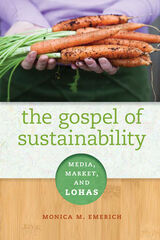
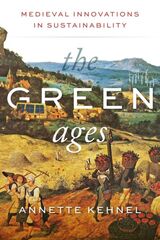
In The Green Ages, historian Annette Kehnel explores sustainability initiatives from the Middle Ages, highlighting communities that operated a barter trade system on the Monte Subiaco in Italy, sustainable fishing at Lake Constance, common lands in the United Kingdom, transient grazing among Alpine shepherds in the south of France, and bridges built by crowdfunding in Avignon. Kehnel takes these medieval examples and applies their practical lessons to the modern world to prove that we can live sustainably—we’ve done it before!
From the garden economy in the mythical-sounding City of Ladies to early microcredit banks, Kehnel uncovers a world at odds with our understanding of the typical medieval existence. Premodern history is full of inspiring examples and concepts ripe for rediscovery, and we urgently need them as today’s challenges—finite resources, the twilight of consumerism, and growing inequality—threaten what we have come to think of as a modern way of living sustainably. This is a stimulating and revelatory look at a past that has the power to change our future.
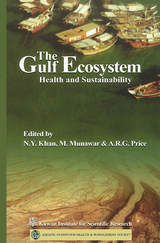

Hope Is an Imperative brings together in a single volume Professor Orr’s most important works. These include classics such as “What Is Education For?,” one of the most widely reprinted essays in the environmental literature, “The Campus and the Biosphere,” which helped launch the green campus movement,and “Loving Children: A Design Problem,” which renowned theologian and philosopher Thomas Berry called “the most remarkable essay I’ve read in my whole life.”
The book features thirty-three essays, along with an introductory section that considers the evolution of environmentalism, section introductions that place the essays into a larger context, and a foreword by physicist and author Fritjof Capra.
Hope Is an Imperative is a comprehensive collection of works by one of the most important thinkers and writers of our time. It offers a complete introduction to the writings of David Orr for readers new to the field, and represents a welcome compendium of key essays for longtime fans. The book is a must-have volume for every environmentalist’s bookshelf.
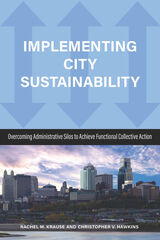
Implementing City Sustainability examines the structures and processes that city governments employ to pursue environmental, social, and economic well-being within their communities. As American cities adopt sustainability objectives, they are faced with the need to overcome fuzzy-boundary, coordination, and collective action challenges to achieve successful implementation.
Sustainability goals often do not fit neatly into traditional city government structures, which tend to be organized around specific functional responsibilities, such as planning, public works, parks and recreation, and community development. The authors advance a theory of Functional Collective Action and apply it to local sustainability to explain how cities can—and in some cases do—organize to successfully administer changes to achieve complex objectives that transcend these organizational separations. Implementing City Sustainability uses a mixed-method research design and original data to provide a national overview of cities’ sustainability arrangements, as well as eight city case studies highlighting different means of organizing to achieve functional collective action.
By focusing not just on what cities are doing to further sustainability, but also on how they are doing it, the authors show how administrative structure enables—or inhibits—cities to overcome functional divides and achieve successful outcomes.
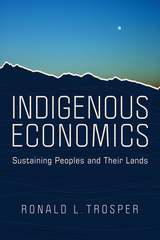
What does “development” mean for Indigenous peoples? Indigenous Economics lays out an alternative path showing that conscious attention to relationships among humans and the natural world creates flourishing social-ecological economies.
Economist Ronald L. Trosper draws on examples from North and South America, Aotearoa/New Zealand, and Australia to argue that Indigenous worldviews centering care and good relationships provide critical and sustainable economic models in a world under increasing pressure from biodiversity loss and climate change. He explains the structure of relational Indigenous economic theory, providing principles based on his own and others’ work with tribal nations and Indigenous communities. Trosper explains how sustainability is created at every level when relational Indigenous economic theory is applied—micro, meso, and macro.
Good relationships support personal and community autonomy, replacing the individualism/collectivism dichotomy with relational leadership and entrepreneurship. Basing economies on relationships requires changing governance from the top-down approaches of nation-states and international corporations; instead, each community creates its own territorial relationships, creating plurinational relational states. This book offers an important alternative to classic economic theory. In Indigenous Economics, support for Indigenous communities’ development and Indigenous peoples’ well-being go hand-in-hand.
Publication of this book is made possible in part by the Alfred P. Sloan Foundation Program in Public Understanding of Science.
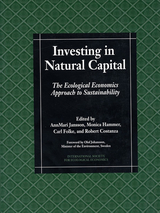
Investing in Natural Capital presents the results of a workshop held following the second biannual conference of the International Society for Ecological Economics. It focuses on the relation of human development to natural capital, and the relation of natural capital to environmental processes.
Because we are capable of understanding our impact on the environment and the importance of managing it sustainably, humans play a special role in our ecosystem. The book emphasizes the essential connections between natural ecosystems and human socioeconomic systems, and the importance of insuring that both remain resilient. Specific chapters deal with methodology, case material, and policy questions, and offer a thorough exploration of this provocative and important alternative to conventional economics.
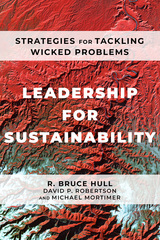
Leadership for Sustainability gives readers perspective and skills for promoting creative and collaborative solutions. Blending systems thinking approaches with leadership techniques, it offers dozens of strategies and specific practices that build on the foundation of three main skills: connecting, collaborating, and adapting. Inspiring case studies show how the book’s strategies and principles can be applied to diverse situations:
- Coordinating the activities of widely dispersed individuals and groups who may not even know they are connected, illustrated by the work of urban planners, local businesses, citizens, and other stakeholders advancing ambitious climate action goals via a Community Energy Plan in Arlington County, Virginia
- Collaborating with diverse stakeholders to span boundaries despite their differences of opinion, expertise, and culture, as illustrated by the bold actions of a social entrepreneur who transformed the global food service industry with the “plant-forward” movement
- Adapting to continuous change and confounding uncertainty, as a small nonprofit organization mobilizes partners to tackle poverty, water scarcity, sanitation, and climate change in rural India
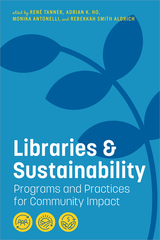
As a core value of librarianship, sustainability is not an end point but a mindset, a lens through which operational and outreach decisions can be made. And it extends beyond an awareness of the roles that libraries can play in educating and advocating for a sustainable future. As the programs and practices in this resource demonstrate, sustainability can also encompass engaging with communities in discussions about resilience, regeneration, and social justice. Inspiring yet assuredly pragmatic, the many topics explored in this book edited by members of ALA's Sustainability Round Table and ALA’s Special Task Force on Sustainability include
- a discussion of why sustainability matters to libraries and their user communities;
- real-life examples of sustainability programming, transformative community partnerships, collective responses for climate resilience, and green building practices;
- lessons learned and recommendations from library workers who have been active in putting sustainability into practice;
- the intersection of sustainability with the work of equity, diversity, and inclusion;
- suggestions regarding the revision of library and information science curriculum in light of the practical need to build community resilience;
- an examination of how libraries’ efforts to support Doughnut Economics can bolster the United Nations' work on the Sustainable Development Goals, which seek to address the global impacts of climate change; and
- potential collaborators for future sustainability-related initiatives.

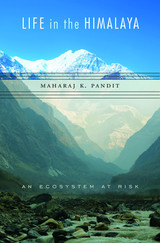
The collision of the Indian and Eurasian plates around fifty million years ago profoundly altered earth’s geography and regional climates. The rise of the Himalaya led to intensification of the monsoon, the birth of massive glaciers and turbulent rivers, and an efflorescence of ecosystems along the most extreme elevational gradient on Earth. When the Ice Age ended, humans became part of this mix, and today nearly one quarter of the world’s population inhabits its river basins, from Afghanistan to Myanmar. Life in the Himalaya examines the region’s geophysical and biological systems and explores the past and future of human sustainability in the mountain’s shadow.
Maharaj Pandit divides the Himalaya’s history into four phases. During the first, the mountain and its ecosystems formed. In the second, humans altered the landscape, beginning with nomadic pastoralism, continuing to commercial deforestation, and culminating in pockets of resistance to forest exploitation. The third phase saw a human population explosion, accompanied by road and dam building and other large-scale infrastructure that degraded ecosystems and caused species extinctions. Pandit outlines a future networking phase which holds the promise of sustainable living within the mountain’s carrying capacity.
Today, the Himalaya is threatened by recurrent natural disasters and is at risk of catastrophic loss of life. If humans are to have a sustainable future there, Pandit argues, they will need to better understand the region’s geological vulnerability, ecological fragility, and sociocultural sensitivity. Life in the Himalaya outlines the mountain’s past in order to map a way forward.
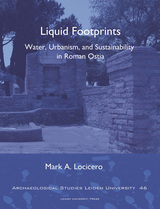

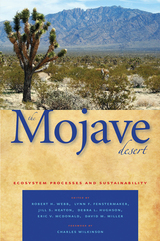
In The Mojave Desert, thirty-eight scientists who are all specialists in desert ecology address the threats to the Mojave, as well as the potential for natural recovery and active restoration. The contributing authors discuss the desert from several perspectives: regional threats such as expanding human populations, climate change, atmospheric nitrogen deposition, and invasive plants; the impact of roads in a desert ecosystem; soils and plant communities; shrinking aquifers; and the monitoring and sustainability of this fragile ecosystem. Finally, they discuss the importance of long-term data and the ways scientists and resource managers can interact to enhance understanding of the processes of change in the Mojave Desert and to advance the preservation and restoration of its precious resources.The Mojave Desert offers the fruits of extensive research in a number of disciplines and a sound assessment of the current state and possible future of one of the world's major deserts. As human intrusion and climate change increasingly threaten the Mojave's ecosystem, studies like this are essential in helping scientists, land managers, and the general public understand what is at risk and what can be done to preserve this austere and hauntingly beautiful region.
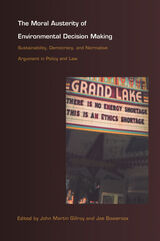
The contributors search for these assumptions and principles in short arguments and debates over the role of science, social justice, instrumental value, and intrinsic value in contemporary environmental policy. In their discussion of moral alternatives to enrich environmental decision making and in their search for a less austere and more robust role for normative discourse in practical policy making, they analyze a series of original case studies that deal with environmental sustainability and natural resources policy including pollution, land use, environmental law, globalism, and public lands. The unique structure of the book—which features the core contributors responding in a discourse format to the central chapters’ essays and debates—helps to highlight the role personal and public values play in democratic decision making generally and in the field of environmental politics specifically.
Contributors. Joe Bowersox, David Brower, Susan Buck, Celia Campbell-Mohn, John Martin Gillroy, Joel Kassiola, Jan Laitos, William Lowry, Bryan Norton, Robert Paehlke, Barry G. Rabe, Mark Sagoff, Anna K. Schwab, Bob Pepperman Taylor, Jonathan Wiener
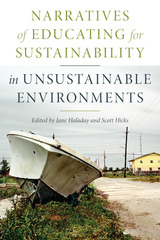
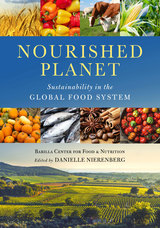
In Nourished Planet, the Barilla Center for Food & Nutrition offers a global plan for feeding ourselves sustainably. Drawing on the diverse experiences of renowned international experts, the book offers a truly planetary perspective. Essays and interviews showcase Hans Herren, Vandana Shiva, Alexander Mueller, and Pavan Suhkdev, among many others.
Together, these experts plot a map towards food for all, food for sustainable growth, food for health, and food for culture. With these ingredients, we can nourish our planet and ourselves.
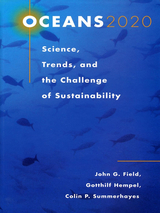
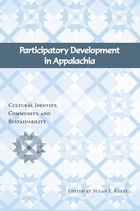
Emerging from a critical analysis of the modern development process, the participatory development approach advocated in this book assumes that local culture has value, that local communities have assets, and that local people have the capacity to envision and provide leadership for their own social change. It thus promotes better decision making in Appalachian communities through public participation and civic engagement.
Filling a void in current research by detailing useful, hands-on tools and methods employed in a variety of contexts and settings, the book combines relevant case studies of successful participatory projects with practical recommendations from seasoned professionals. Editor Susan E. Keefe has included the perspectives of anthropologists, sociologists, and others who have been engaged, sometimes for decades, in Appalachian communities. These contributors offer hopeful new strategies for dealing with Appalachia's most enduring problems-strategies that will also aid activists and researchers working in other distressed or underserved communities.
Susan E. Keefe is professor of anthropology at Appalachian State University. She is the editor of Appalachian Mental Health and Appalachian Cultural Competency: A Guide for Medical, Mental Health, and Social Service Professionals.
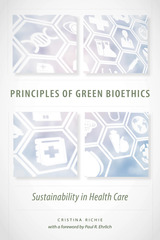

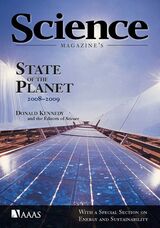
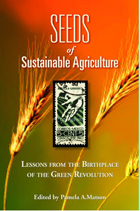
The Yaqui Valley is the birthplace of the Green Revolution and one of the most intensive agricultural regions of the world, using irrigation, fertilizers, and other technologies to produce some of the highest yields of wheat anywhere. It also faces resource limitations, threats to human health, and rapidly changing economic conditions. In short, the Yaqui Valley represents the challenge of modern agriculture: how to maintain livelihoods and increase food production while protecting the environment.
Renowned scientist Pamela Matson and colleagues from leading institutions in the U.S. and Mexico spent fifteen years in the Yaqui Valley in Sonora, Mexico addressing this challenge. Seeds of Sustainability represents the culmination of their research, providing unparalleled information about the causes and consequences of current agricultural methods. Even more importantly, it shows how knowledge can translate into better practices, not just in the Yaqui Valley, but throughout the world.
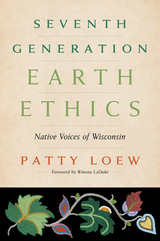
The Native people whose lives are depicted in Seventh Generation Earth Ethics understood the cultural gravity that kept their people rooted to their ancestral lands and acted in ways that ensured the growth and success of future generations. In this way they honor the Ojibwe Seventh Generation philosophy, which cautions decision makers to consider how their actions will affect seven generations in the future—some 240 years.
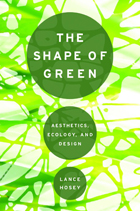
Does going green change the face of design or only its content? The first book to outline principles for the aesthetics of sustainable design, The Shape of Green argues that beauty is inherent to sustainability, for how things look and feel is as important as how they’re made.
In addition to examining what makes something attractive or emotionally pleasing, Hosey connects these questions with practical design challenges. Can the shape of a car make it more aerodynamic and more attractive at the same time? Could buildings be constructed of porous materials that simultaneously clean the air and soothe the skin? Can cities become verdant, productive landscapes instead of wastelands of concrete?
Drawing from a wealth of scientific research, Hosey demonstrates that form and image can enhance conservation, comfort, and community at every scale of design, from products to buildings to cities. Fully embracing the principles of ecology could revolutionize every aspect of design, in substance and in style. Aesthetic attraction isn’t a superficial concern — it’s an environmental imperative. Beauty could save the planet.
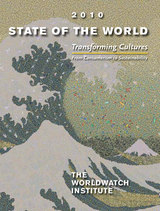
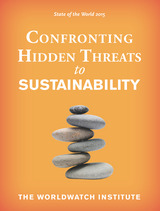
In State of the World 2015, the flagship publication of The Worldwatch Institute, experts explore hidden threats to sustainability and how to address them. How will nations deal with migration as climate change refugees cross borders in order to escape flooding, drought, or other extreme weather events? What will happen to the price and availability of fossil energy—the foundation of industrial civilization--as these resources oscillate between surplus and scarcity? If perpetual economic growth on a finite planet is impossible, what are the alternatives? Can national governments manage the transition? Eight key issues are addressed in depth, along with the central question of how we can develop resilience to these and other shocks.
For decades, The Worldwatch Institute has been a leader in identifying and analyzing emerging environmental threats. With the latest edition of State of The World, the authorities at Worldwatch bring to light challenges we can no longer afford to ignore.
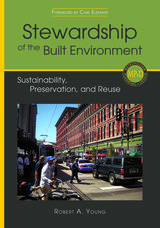
Young begins by describing how historic preservation in the United States, often overlooked because of the predominant focus on new construction, is actually an important sustainable design strategy. He then examines the social, environmental, and economic benefits of preservation—from the societal value of reusing existing buildings to financial incentives available for rehabilitation. Young concludes with insights into the future of reusing buildings as a sustainability strategy. He also provides several informative appendices, including a glossary of key terms and acronyms and recommendations for further reading.
Readers will become familiar with essential terminology; sustainability and historic preservation metrics; government oversight processes; and opportunities for smart growth afforded by rehabilitation. This knowledge is key to preserving the past while building a sustainable future.
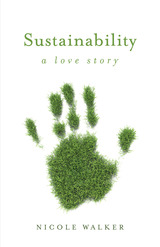
This book is for the burnt-out environmentalist, the lazy environmentalist, the would-be environmentalist. It’s for those who believe the planet is dying. For those who believe they are dying. And for those who question what it means to live and love sustainably, and maybe even with hope.
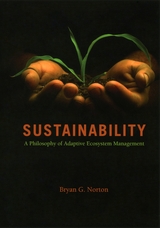
Emphasizing cooperation and adaptation through social learning, Norton provides a practical framework that encourages an experimental approach to language clarification and problem formulation, as well as an interdisciplinary approach to creating solutions. By moving beyond the scientific arena to acknowledge the importance of public discourse, Sustainability offers an entirely novel approach to environmentalism.
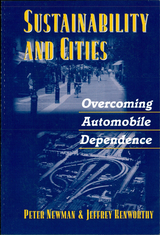
The book begins with chapters that set forth the notion of sustainability and how it applies to cities and automobile dependence. The authors consider the changing urban economy in the information age, and describe the extent of automobile dependence worldwide. They provide an updated survey of global cities that examines a range of sustainability factors and indicators, and, using a series of case studies, demonstrate how cities around the world are overcoming the problem of automobile dependence. They also examine the connections among transportation and other issues—including water use and cycling, waste management, and greening the urban landscape—and explain how all elements of sustainability can be managed simultaneously.
The authors end with a consideration of how professional planners can promote the sustainability agenda, and the ethical base needed to ensure that this critical set of issues is taken seriously in the world's cities.
Sustainability and Cities will serve as a source of both learning and inspiration for those seeking to create more sustainable cities, and is an important book for practitioners, researchers, and students in the fields of planning, geography, and public policy.

The volume focuses primarily on the Precolumbian Maya but offers several analogous case studies outside the ancient Maya world that illustrate the pervasiveness of water’s role in sustainability, including an ethnographic study of the sustainability of small-scale, farmer-managed irrigation systems in contemporary New Mexico and the environmental consequences of Angkor’s growth into the world’s most extensive preindustrial settlement. The archaeological record offers rich data on past politics of climate change, while epigraphic and ethnographic data show how integrated the ideological, political, and environmental worlds of the Maya were.
While Sustainability and Water Management in the Maya World and Beyond stresses how lessons from the past offer invaluable insight into current approaches of adaptation, it also advances our understanding of those adaptations by making the inevitable discrepancies between past and present climate change less daunting and emphasizing the sustainable negotiations between humans and their surroundings that have been mediated by the changing climate for millennia. It will appeal to students and scholars interested in climate change, sustainability, and water management in the archaeological record.
Contributors: Mary Jane Acuña, Wendy Ashmore, Timothy Beach, Jeffrey Brewer, Christopher Carr, Adrian S. Z. Chase, Arlen F. Chase, Diane Z. Chase, Carlos R. Chiriboga, Jennifer Chmilar, Nicholas Dunning, Maurits W. Ertsen, Roland Fletcher, David Friedel, Robert Griffin, Joel D. Gunn, Armando Anaya Hernández, Christian Isendahl, David Lentz, Sheryl Luzzadder-Beach, Dan Penny, Kathryn Reese-Taylor, Michelle Rich, Cynthia Robin, Sylvia Rodríguez, William Saturno, Vernon Scarborough, Payson Sheets, Liwy Grazioso Sierra, Michael Smyth, Sander van der Leeuw, Andrew Wyatt

Sustainability for the Forgotten is an incendiary book that confronts the history, policies, and practices of sustainability. It interrogates the usefulness of current sustainability approaches for the poorest of the poor, the chronic underclass, victims of natural disasters, refugees, the oppressed, and asks, how can we do better? With examples that range from the coffeelands of El Salvador to the coal country of American Appalachia, from the streets of Detroit to refugee camps in Greece and the upscale metro centers of the affluent, sustainability is examined with a critical eye and with an emphasis on insuring that the forgotten are heard.
At once well-researched and passionate, wide-ranging and sharply focused, Sustainability for the Forgotten is unlike any other book on the sustainability movement. Written with a distinctive voice that is reasoned, unflinching, and often poetic, the book challenges the sustainability movement to follow "a just and necessary path." The result is a provocative statement on the future of sustainability and a call to action that is ultimately hopeful.
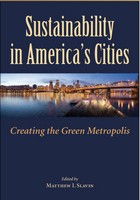
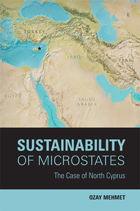
Utah Series in Middle East Studies
This interdisciplinary study discusses the development, economics, and politics of North Cyprus, a divided state since 1960 when sovereignty was surrendered by the British to both Greek and Turkish Cypriots. Mehmet works to demonstrate that, as a microstate with an area of just 3,442 square kilometers, North Cyprus possesses certain inherent comparative economic advantages in the service sectors that enable it to be sustainable in today's rapidly globalizing and competitive economic world.
Mehmet bases his arguments for the potential sustainability of North Cyprus on the concept of economic rationalism, in which participating parties work to optimize their own self-interest. In an ethnic conflict like that of North Cyprus, the logic of optimization demands a rational, free, and objective balancing of competing interests to reach an agreed solution. The economic rationalist approach sharply contrasts with the highly emotional political, historical, cultural, and legal approaches that have thus far dominated the study and discussion of the Cyprus problem, approaches that have largely resulted in a protracted conflict.
While recognizing the negative forces of ethnic tension and the very real possibility of a continued divided Cyprus state, Sustainability of Microstates nevertheless remains hopeful, designed to unleash the forces of convergence that may be deduced from economic rationalism, and unwavering in its conviction of the ultimate sustainability of North Cyprus.

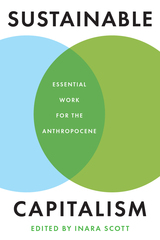
Sustainable Capitalism takes on the challenge of sustainability from a uniquely interdisciplinary and diverse perspective, offering both theory and tools for action. Topics range from an analysis of the foundations and definition of capitalism to the specific regulatory mechanisms that may be necessary to rein in its current, unsustainable trajectory. Readers will find nuanced and important analyses of options and potential outcomes that are not available in any other work. This book is essential reading for anyone concerned about the path we are on and how we might improve the lives of people around the globe.


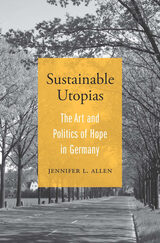
To reclaim a sense of hope for the future, German activists in the late twentieth century engaged ordinary citizens in innovative projects that resisted alienation and disenfranchisement.
By most accounts, the twentieth century was not kind to utopian thought. The violence of two world wars, Cold War anxieties, and a widespread sense of crisis after the 1973 global oil shock appeared to doom dreams of a better world. The eventual victory of capitalism and, seemingly, liberal democracy relieved some fears but exchanged them for complacency and cynicism.
Not, however, in West Germany. Jennifer Allen showcases grassroots activism of the 1980s and 1990s that envisioned a radically different society based on community-centered politics—a society in which the democratization of culture and power ameliorated alienation and resisted the impotence of end-of-history narratives. Berlin’s History Workshop liberated research from university confines by providing opportunities for ordinary people to write and debate the story of the nation. The Green Party made the politics of direct democracy central to its program. Artists changed the way people viewed and acted in public spaces by installing objects in unexpected environments, including the Stolpersteine: paving stones, embedded in residential sidewalks, bearing the names of Nazi victims. These activists went beyond just trafficking in ideas. They forged new infrastructures, spaces, and behaviors that gave everyday people real agency in their communities. Undergirding this activism was the environmentalist concept of sustainability, which demanded that any alternative to existing society be both enduring and adaptable.
A rigorous but inspiring tale of hope in action, Sustainable Utopias makes the case that it is still worth believing in human creativity and the labor of citizenship.
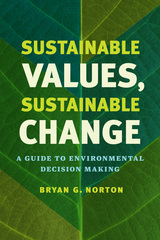
While economists, philosophers, and ecologists argue about what in nature is valuable, and why, Norton here offers an action-oriented, pragmatic response to the disconnect between public and academic discourse around sustainability. Looking to the arenas in which decisions are made—and the problems that are driving these decisions—Norton reveals that the path to sustainability cannot be guided by fixed, utopian objectives projected into the future; sustainability will instead be achieved through experimentation, incremental learning, and adaptive management. Drawing inspiration from Aldo Leopold’s famed metaphor of “thinking like a mountain” for a spatially explicit, pluralistic approach to evaluating environmental change, Norton replaces theory-dependent definitions with a new decision-making process guided by deliberation and negotiation across science and philosophy, encompassing all stakeholders and activists and seeking to protect as many values as possible. Looking across scales to today’s global problems, Norton urges us to learn to think like a planet.
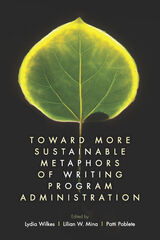
This volume presents twelve chapters that reclaim and revise established metaphors; offer new metaphors based on sustainable, relational, or emotional labor practices and phenomena; and reveal the improvisational, artisanal nature of WPA work. Chapters resonate across three sections. The first section focuses on organic relationships captured in phrases like “putting out fires” and "seeing forests for the trees” alongside unexpected comparisons to ground and light. The second describes institutional landscapes featuring generative juxtapositions such as the WPA as a labor activist or a mapper of emotional geography. And the third discusses performance crafts like improv comedy and artisanal making.
Toward More Sustainable Metaphors of Writing Program Administration offers new and revised ways of thinking and acting for WPAs, who are constantly negotiating the paradoxical demands of their work and continually striving to act ethically in conflicted, and even fraught, situations. It will inspire practicing, aspiring, and former WPAs working in a time of transformation by highlighting more sustainable ways of enacting WPA identity.
Contributors: Jacob Babb, John Belk, Katherine Daily O'Meara, Ryan J. Dippre, Douglas Hesse, Andrew Hollinger, Rona Kaufman, Cynthia D. Mwenja, Manny Piña, Scott Rogers, Robyn Tasaka, Alexis Teagarden, Christy I. Wenger, Lydia Wilkes
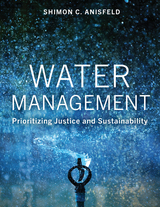
This text fills that need by providing the necessary knowledge base for understanding and managing complex water problems. It is geared primarily towards students in water management courses at the undergraduate and graduate levels but will also be a helpful resource for practicing water professionals who want to get new ideas or a broader view of the subject.
Rather than focusing on one type of water problem (as many water books do), this text explores the entire gamut of water issues, from dams to desalination, from flooding to famine, from prior appropriation to pumped storage, from sanitation to stormwater. And rather than teaching from one disciplinary perspective (as many water books do), it looks at water problems through a variety of lenses: hydrology, climate science, ecology, and engineering, but also law, economics, history, and environmental justice. The result is a concise yet comprehensive introduction to one of the most critical and demanding challenges of our time: developing just and sustainable solutions to water management.
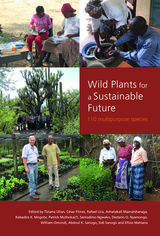
The publication forms one of the main dissemination achievements of The MGU–Useful Plants Project, developed under Kew’s Millennium Seed Bank partnership, to conserve and use sustainably wild plants important for rural communities in Botswana, Kenya, Mali, South Africa, and Mexico. Institutional partners led the project in each country, involving rural communities, local authorities, and schools. A scientific approach was applied throughout.
The core of this book presents detailed species profiles of 110 plants selected for their importance to communities and livelihoods. The profiles are structured in a clear and consistent format, providing information on taxonomy and nomenclature, plant descriptions, fruit and seed structures, distribution, habitat, uses, known hazards and safety, conservation status, seed conservation, propagation, and trading, along with key references from the literature.
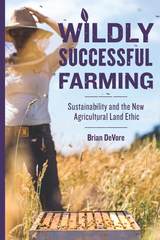
Written by agricultural journalist Brian DeVore, the book is based on interviews he has conducted at farms, wildlife refuges, laboratories, test plots, and gardens over the past twenty-five years. He documents innovations in cover cropping, managed rotational grazing, perennial polyculture, and integrated pest management. His accounts provide insight into the impacts regenerative farming methods can have on wildlife, water, landscape, soils, and rural communities and suggest ways all of us can support wildly successful farmers.
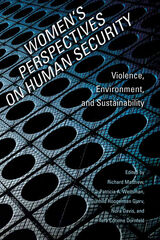
Violent conflict, climate change, and poverty present distinct threats to women worldwide. Importantly, women are leading the way creating and sharing sustainable solutions.
Women’s security is a valuable analytical tool as well as a political agenda insofar as it addresses the specific problems affecting women’s ability to live dignified, free, and secure lives. First, this collection focuses on how conflict impacts women’s lives and well-being, including rape and gendered constructions of ethnicity, race, and religion. The book’s second section looks beyond the scope of large-scale violence to examine human security in terms of environmental policy, food, water, health, and economics.
Multidisciplinary in scope, these essays from new and established contributors draw from gender studies, international relations, criminology, political science, economics, sociology, biological and ecological sciences, and planning.
READERS
Browse our collection.
PUBLISHERS
See BiblioVault's publisher services.
STUDENT SERVICES
Files for college accessibility offices.
UChicago Accessibility Resources
home | accessibility | search | about | contact us
BiblioVault ® 2001 - 2024
The University of Chicago Press


